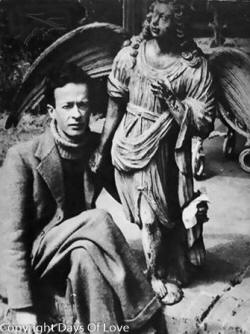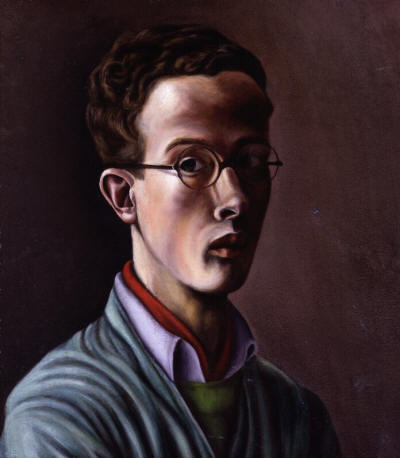

Partner Eric Oliver
Queer Places:
Repton School, Willington Rd, Repton, Derby DE65 6FH, UK
33 The Little Boltons, Kensington, London SW10 9LL, UK
Robert Adam St, Manchester St, Marylebone, London W1U 3AF, UK
34 Crooms Hill, London SE10 8ER, UK
Middle Orchard, Crouch, Borough Green, Sevenoaks TN15 8QB, UK
 Maurice
Denton Welch (29 March 1915 – 30 December 1948)[1]
was an English writer and painter, admired for his vivid prose and precise
descriptions.
Maurice
Denton Welch (29 March 1915 – 30 December 1948)[1]
was an English writer and painter, admired for his vivid prose and precise
descriptions.
Welch was born in Shanghai to Arthur Joseph Welch, a wealthy English rubber merchant, and his American wife, Rosalind Bassett.[1] Welch spent his childhood in China – he recorded this in his fictionalised autobiography of his early years, Maiden Voyage (1943). With the help and patronage of Edith Sitwell and John Lehmann this became a small but lasting success and made for him a distinct and individual reputation. It was followed by the novel In Youth is Pleasure (1944), a study of adolescence, and by Brave and Cruel (1949), short stories. An unfinished autobiographical novel A Voice Through a Cloud was published posthumously in 1950.
As a fifteen-year-old schoolboy, the writer Denton Welch saw a grumpy old man on a train who turned out to be Lord Alfred Douglas. Welch later wrote: ‘I was thrilled. I had just read all about Oscar Wilde.’ For Welch, who was born in 1915, Wilde continued to be a significant cultural and erotic forebear. In his late twenties in July 1943, after chatting with a brace of bathing boys he wrote in his diary: ‘I began to think of Oscar Wilde … and all the people who have longed to become young again. I don’t know why 1890 should leap to my mind the whole time. Is it because they worshipped youth? Or is it because it always seems to me a rosy time for young men to be gay and wilful and wasteful?’
Welch did not set out to be a writer. After leaving Repton, he studied art at Goldsmiths' in London with the intention of becoming a painter.[2] At the age of twenty,[1] he was hit by a car while cycling in Surrey and suffered a fractured spine. Although he was not paralysed, he suffered severe pain and complications, including spinal tuberculosis that ultimately led to his early death.

Self-Portrait
His literary work, intense and introverted, includes insightful portraits of his friends, and minutely observed portraits of the English countryside during World War II. A close attention to aesthetics, be it in human behaviour, physical appearance, clothing, art, architecture, jewellery, or antiques, is also a recurring concern in his writings. Shorter works include an essay on the painter Walter Sickert which, published originally in Horizon brought him to the notice of Sitwell. He continued occasionally to paint; there is a fine self-portrait (in the National Portrait Gallery), and some intricate line illustrations in the early editions of his books.
William S. Burroughs cited Welch as the writer who most influenced his own work[3] and dedicated his novel The Place of Dead Roads to him.
My published books: